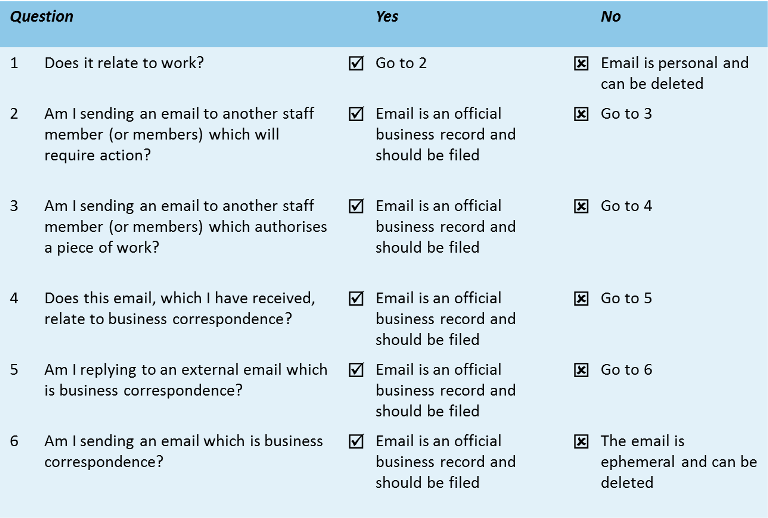Email is a record
Public Records are defined by the Public Records Act 1973 to be “any record made or received by a public officer in the course of his duties”. As emails are made or received by public officers as part of the jobs they do in government they are definitely considered to be public records and should be managed according to the requirements of the PROV Standards.
Records can be made up of one or more documents. This is often true of emails which may be made up of an email plus attachments. In this case the record would consist of both the email itself and its attachment(s).
To manage email records effectively, Victorian Government agencies should:
- Identify and retain emails that are records of official government business and dispose of those that are not
- Develop policies and procedures, communicate requirements to all agency staff on a regular basis and ensure this is included in induction and training sessions
- Determine and implement the most effective way for email records to be stored, so that they are accessible and preserved for as long as legally required
- Determine the most effective approach to migrating email from one system to another in a manner that preserves the integrity of the email as a record
- Understand the risks around their email and systems
Email categories for retention and disposal
Email created or received by most agencies can generally be divided into three broad categories, each with different retention and disposal requirements.
| Type | Description | Disposal recommendation |
| Personal email | Emails which relate to private or personal matters and have nothing to do with the business of the agency. Examples of personal email includes email dealing with topics such as:
|
Personal email can be destroyed as soon as staff no longer require the email. |
| Ephemeral email | Emails which facilitate agency business but do not need to be retained for business purposes. Examples of this type of email include:
|
Ephemeral emails can be destroyed as part of normal administrative practice (NAP). |
| Official business email |
Emails which form part of the public record and which document the business activities of the agency.
|
Official business email must be retained for as long as is determined by the relevant Retention and Disposal Authorities (RDAs).
|
Checklist for identifying email category

Policy, procedure and staff support
Agencies should ensure that email is covered in their wider information management and records management policies and procedures to help define:
- Which emails need to be captured as records
- Who is responsible for capturing records from email systems and when
- How emails should be captured in the agency*
* Note that some of these actions could be performed automatically by a system.
It is also important to provide continuing communications, training and support to staff to ensure emails are being managed properly in the agency.
Storage requirements
Official business email records should be stored in a system that can manage them effectively for as long as needed. This could be an electronic document and records management system (EDRMS), a case management system or another suitable business system.
This will ensure the email records are stored in context with search, access, and disposal functionality as opposed to leaving them in an email system which is designed to store email, not manage them appropriately over time.
Email records of permanent value should be retained as State Archives and transferred to Public Record Office Victoria. See Transferring records to PROV for further information.
